T News International
- Get link
- X
- Other Apps
News you can use: Five practical points about the Israel-Iran war
As Israel is being hit by Iranian missiles and the toll of deaths and injuries rises, life has mostly come to a standstill. Here's what you should know
In the early hours of Friday, Israel started to carry out preemptive strikes against Iran and its nuclear program.
Within hours, Iran began retaliating with barrages of missiles and drones.
1. How is life in Israel affected by the war?
Since 3 a.m. on Friday, the Israel Defense Forces’ Home Front Command has issued nationwide emergency guidelines. All gatherings, whether indoors or outdoors, have been prohibited. Workplaces and businesses are closed, except for essential services such as supermarket
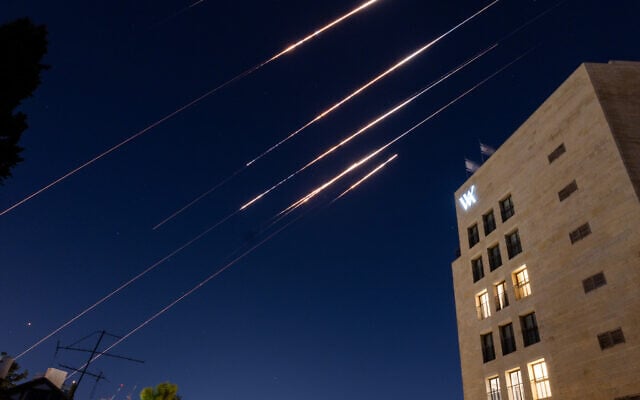
The Home Front Command’s initial guidelines, in place until Saturday at 8 p.m., were extended through Sunday evening, and then again until Tuesday evening. A further assessment is expected afterward.
2. How are Israelis alerted about incoming attacks?
Drones launched from Iran can take hours to reach Israel, while ballistic missiles typically arrive within about 10 minutes. Thanks to its advanced detection capabilities, the Home Front Command has been able to issue alerts for incoming threats several minutes in advance through its smartphone app, available for all devices.
On Saturday, the Home Front Command announced it would begin sending alerts directly to Israelis’ phones 15 to 30 minutes ahead of potential ballistic missile launches based on its ability to detect preparation activities in Iran.
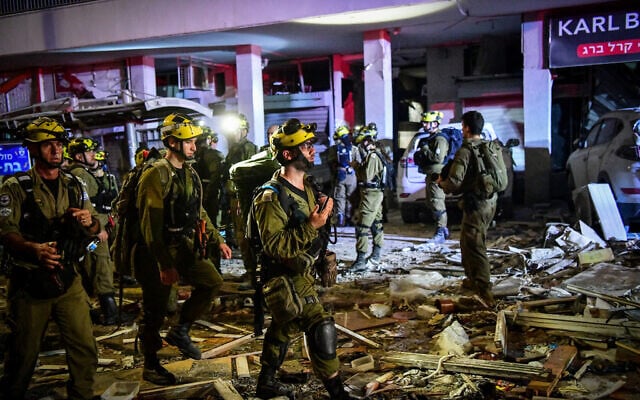
The warnings culminate in sirens that sound approximately 90 seconds before impact.
Both types of alerts are activated only in regions assessed to be at risk.
3. Is it possible to travel to or from Israel?
Israel’s airspace has been closed for landings and takeoffs at Ben Gurion Airport since Friday. It will likely remain so for the foreseeable future as Israel and Iran trade air and missile strikes.
Any announcement of its reopening will give six hours’ advance notice, the Israel Airport Authority said in a statement on Sunday.
El Al announced that all flights were canceled through June 17 and dozens more through June 23.
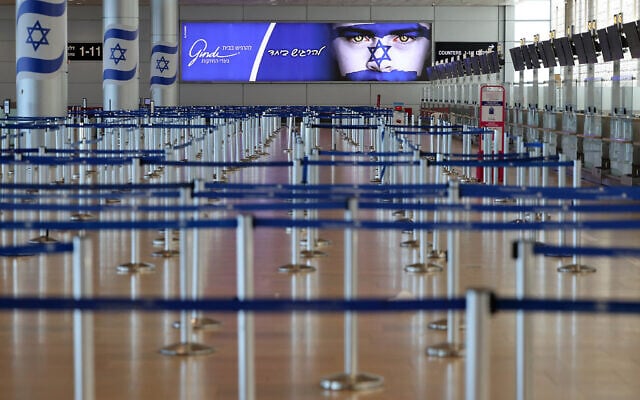
Land border crossings to Jordan and Sinai are open for business and passenger traffic, including the Taba Crossing with Egypt and the Rabin and Jordan River Crossings with Jordan (while the Allenby Crossing remains open for Palestinians).
However, on Sunday, the National Security Council warned Israelis not to try to reach Israel by land through Jordan or Egypt’s Sinai peninsula, citing a high risk of danger to Israelis in the neighboring countries.
4. Are Iran’s proxies in the region joining the fight?
The Iran-backed Houthis from Yemen launched a missile on Friday, hitting a Palestinian town in the West Bank and wounding several people.
The group also claimed to have launched an additional two ballistic missiles against Tel Aviv on Sunday morning. Still, military officials told The Times of Israel that the IDF was unaware of any ballistic missile fire from Yemen in the previous 24 hours.
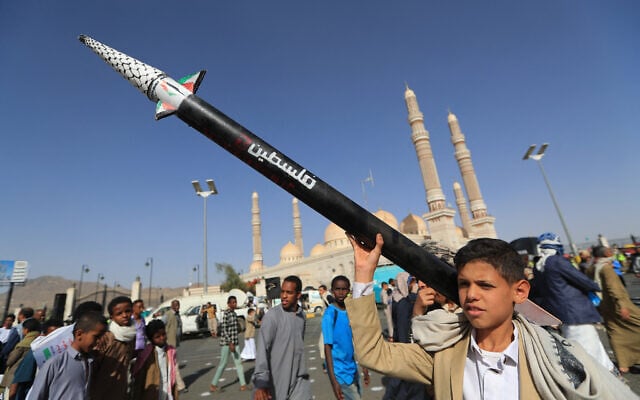
Saturday evening saw two rockets launched from the southern Gaza Strip at southern Israel. The rockets hit open areas, the IDF said, with no injuries caused.
On Sunday, the secretary general of the Iraqi Hezbollah Brigades — one of the largest pro-Iranian militias in Iraq — asserted that “Iran does not need military support from anyone to deter the Zionist entity. It has sufficient personnel and capabilities for that.”
In an interview with an Iraqi news outlet, Abu Hussein al-Hamidawi says the militia is monitoring the situation.
Regarding Hezbollah, an official told Reuters Friday that the Iranian proxy group based in Lebanon would not unilaterally launch an attack on Israel in support of Tehran.
“Hezbollah will not initiate its own attack on Israel in retaliation for Israel’s strikes,” the official said.
According to the Saudi news outlet al-Arabiya, Lebanon’s government also informed the Hezbollah terror group that it would not tolerate the Iranian proxy joining in Tehran’s response against Israel.

At one point, Hezbollah was believed to have some 150,000 rockets and missiles ready to be used against Israel.
Seeking to aid its ally Hamas in the aftermath of the Gaza terrorist group’s October 7, 2023, attack on southern Israel and Israel’s subsequent offensive in Gaza, Hezbollah began launching rockets across the border on October 8, 2023.
That drew Israeli airstrikes and shelling, and the exchanges escalated into full-scale war in September 2024. Israel inflicted heavy damage on Hezbollah before a US-negotiated ceasefire halted that conflict last November.
5. How long will Iran continue to strike Israel?
Nobody knows, but further Iranian ballistic missile attacks on Israel are expected IDF Spokesman Brig. Gen. Effie Defrin said in a press conference on Sunday.
“Challenging days are ahead. There will be more launches and impacts in the coming days,” Defrin says.
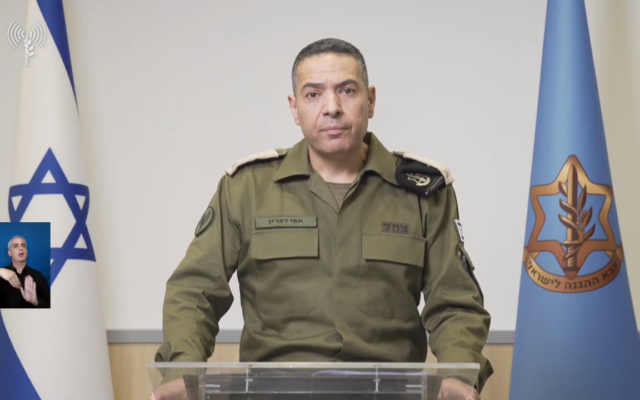
He also says that the Israeli Air Force is “not stopping striking for a moment.”
Emanuel Fabian, Lazar Berman, Sharon Wrobel, Nava Freiberg, Nurit Yohanan, and agencies contributed to this report.
Russia hits Ukraine with biggest attack of the war; F-16 pilot is killed
Zelenskyy renews calls for Washington to sell Patriot missile systems to Kyiv after Kremlin strikes Ukraine with 537 missiles and drones.

KYIV — Russia hit Ukraine with 537 drones and missiles overnight Sunday in Moscow’s largest attack of the war, the Ukrainian Air Force said.
Ukraine shot down 475 of missiles and drones, the air force said, while one Ukrainian F-16 pilot was killed in the action. It was the largest assault the Kremlin has unleashed since the start of Russian President Vladimir Putin’s all-out invasion in early 2022.
The Russian attack started Saturday evening and continued for more than six hours, Ukrainian officials said. Drones and missiles targeted Cherkasy, Lviv, Poltava, Kharkiv, Kherson, Mykolaiv and Kyiv, injuring a dozen people, destroying residential buildings and storage facilities, as well as critical infrastructure around the country, the officials said.
Poland’s tit-for-tat border checks further weaken Schengen
World’s largest free-travel zone is increasingly threatened by supposedly temporary measures to curb migration.

Political posturing over migration has delivered yet another blow to Europe’s beleaguered free-travel zone.
Faced with right-wing demands at home to control the flow of people arriving from outside the EU’s borders, the leaders of Poland and Germany are seeking easy wins which might placate populists — but put the once-sacred Schengen area on life support.
Warsaw’s patience with Germany sending migrants back to Poland “is becoming exhausted,” Polish Prime Minister Donald Tusk said, as he announced the imposition of checks on his country’s borders with Germany and Lithuania from July 7.
Almost four decades after the introduction of the borderless travel area that encompasses 450 million people from 29 countries — four of which aren’t in the EU — supposedly temporary border controls in the name of exceptional security concerns are increasingly the norm, creating the impression Schengen exists more in name than in substance.
But with the rise of far-right parties and several years of migration from Ukraine — and before that, the Middle East — carveouts to the border-free zone rules have become an easy solution for politicians looking to show they mean action.
“We consider the introduction of controls necessary,” Tusk said, pointing the finger at Germany’s “unilateral” action.
In May, the conservative-led government of Chancellor Friedrich Merz ramped up checks on Germany’s borders, including with Poland, following pressure from Berlin’s own opposition party, the far-right Alternative for Germany (AfD).

German police will turn away more undocumented immigrants, including asylum-seekers, Merz said. The move further bolstered border controls the previous government had already put in place October 2023.
The crackdown riled Germany’s neighbors, including Poland, despite Merz’s promises to step up Berlin’s relationship with Warsaw — an alliance he considers key for driving a united European defense policy.
- Get link
- X
- Other Apps

Comments
Post a Comment